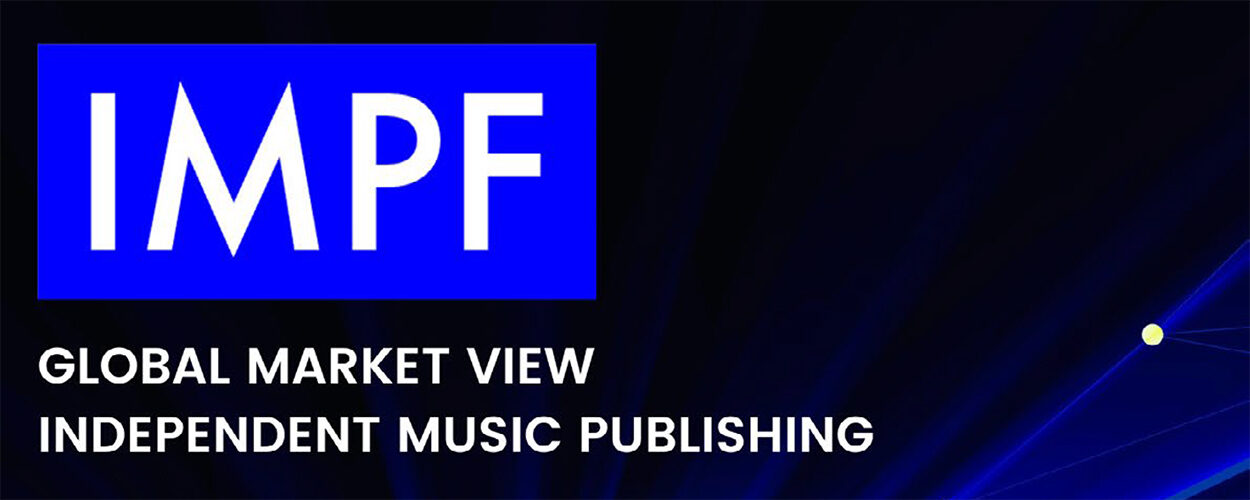This website uses cookies so that we can provide you with the best user experience possible. Cookie information is stored in your browser and performs functions such as recognising you when you return to our website and helping our team to understand which sections of the website you find most interesting and useful.
Business News Labels & Publishers
Indies account for 27.1% of global music publishing market, says new IMPF report
By Chris Cooke | Published on Friday 21 April 2023

The Independent Music Publishers International Forum – or IMPF to its friends – yesterday published its latest ‘Independent Music Publishing Global Market View’.
That’s an annual report that collates and reviews facts and figures about recent trends in music publishing – this time mainly crunching 2021 stats – alongside insights from key executives from the indie side of the music publishing sector.
In terms of top-line figures, the report estimates that the global music publishing market was worth €7.68 billion in 2021, up from €6.51 billion in 2020. Independent publishers – so that’s everyone except the publishing businesses of Sony, Universal, Warner, BMG and Kobalt – together have a market share of 27.1%, which means the indie sector was worth €2.08 billion in 2021, compared with €1.95 billion in 2020.
Of course, the songs side of the music rights industry was more impacted by the COVID pandemic than the recordings side, because songwriters and publishers earn when music is performed live, and things like the broadcast and public performance of music are a much bigger deal in the publishing sector.
Because money that flows through the collective licensing system – which is a lot of the money on the songs side – can take some time to get to the writer and publisher, especially once you go global, revenues received in 2021 and 2022 were affected by the impact COVID had on the industry in 2020 and 2021. However, the IMPF says that 2023 figures should show that the negative impact of COVID is now pretty much over.
During the pandemic, the ongoing rise in streaming revenues helped mitigate to an extent the impact of the slump in live and public performance. Though, of course, when it comes to streaming, much more of the money paid over by the digital platforms flows to the record industry than to writers and publishers.
Although every digital deal is different, of the money that flows from streaming to the music industry, approximately 80% ends up with the record industry and 20% with writers and publishers. That fact remains controversial in the songwriting and publishing communities, with those indie publishers that don’t have sister companies dealing in recorded music being generally the most vocal about this.
The new IMPF report notes: “Various voices from the publishing industry have raised their concern regarding the split between recorded music and music publishing from what is now the main source of revenues for the industry – streaming – with a structural inequity favouring owners of sound recordings vs music publishers”.
“Considering the contributions made by music publishers to the global ecosystem”, it adds, “particularly their work in identifying and developing new talent, many in the industry see this as a basis to call for a ‘rebalancing’ of the streams of revenues between recording and publishing”.
Citing an earlier study by GESAC – which represents song right collecting societies in Europe – the IMPF report goes on: “This 80-20 split is a leftover from the CD era when most of the investment in releasing music fell on the record labels, who had to incorporate the cost of physical distribution into their cost structure. But while the split structure was relevant in the physical era, publishers and songwriters feel that time has come for a fairer distribution of revenue between recording and publishing”.
Expanding on this, Ender Atis from German publisher BuddeMusic is quoted in the report as saying: “Like every other sector of the music industry, the business of music publishers has been transformed by the advent of streaming services. It has taken a while and a lot of effort, but digital revenues are starting to become significant for us and sit alongside our traditional revenue streams”.
“However, many publishers believe that songs and compositions continue to remain undervalued in the digital licensing market, especially in comparison to recordings”, he adds. “It is our mission to establish fair terms for songwriters and publishers in the digital world; terms that reflect the essential role our works play”.
You can download the full report here.





